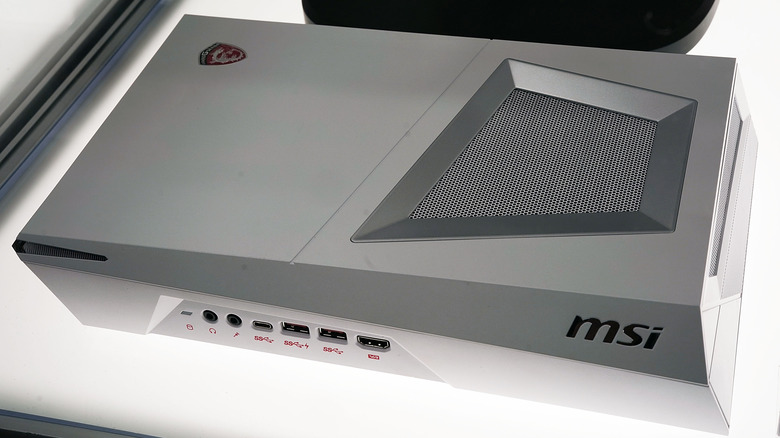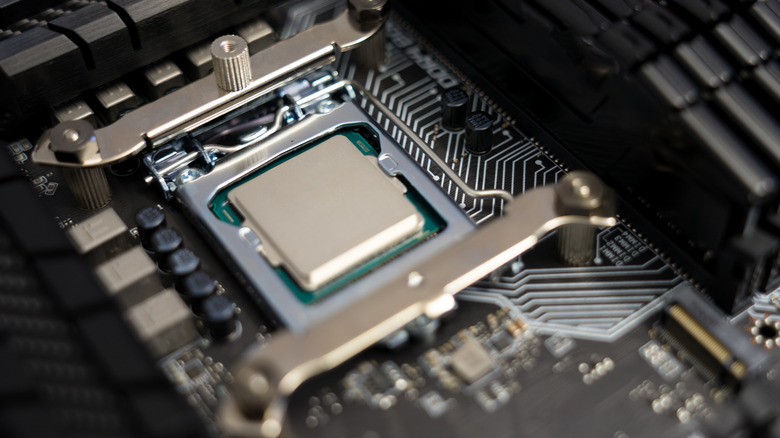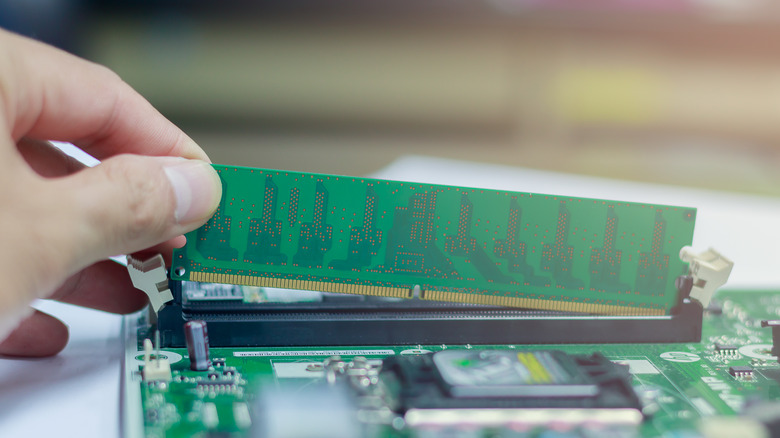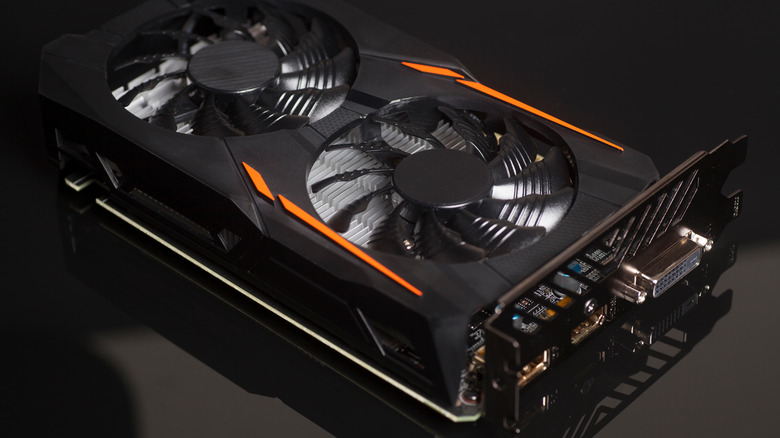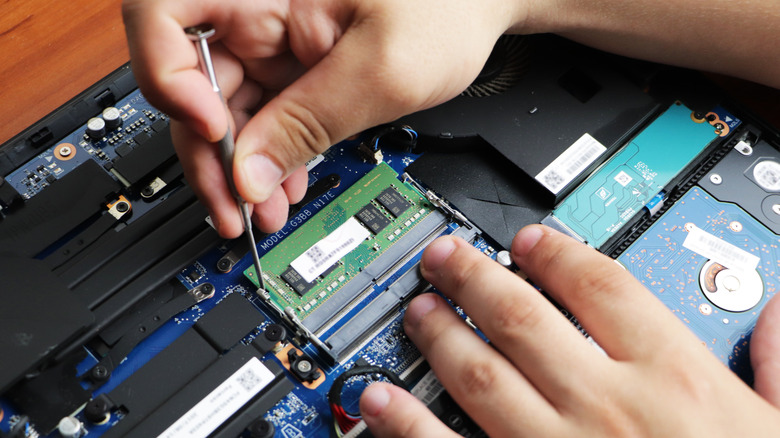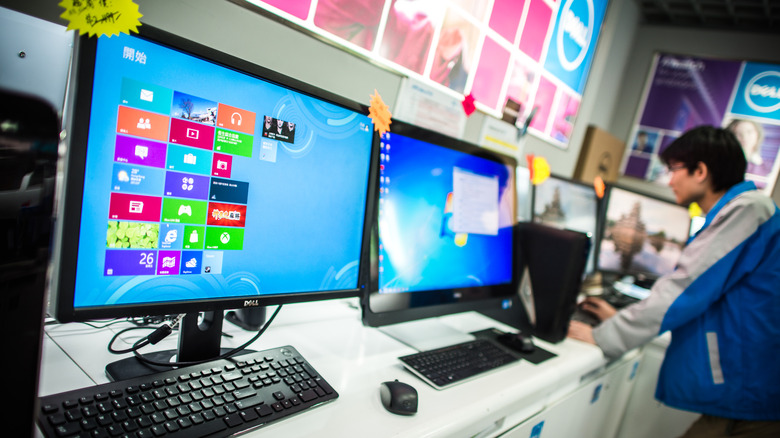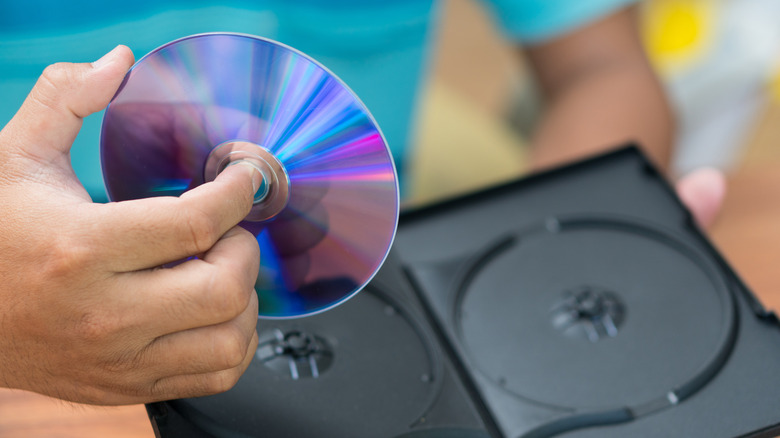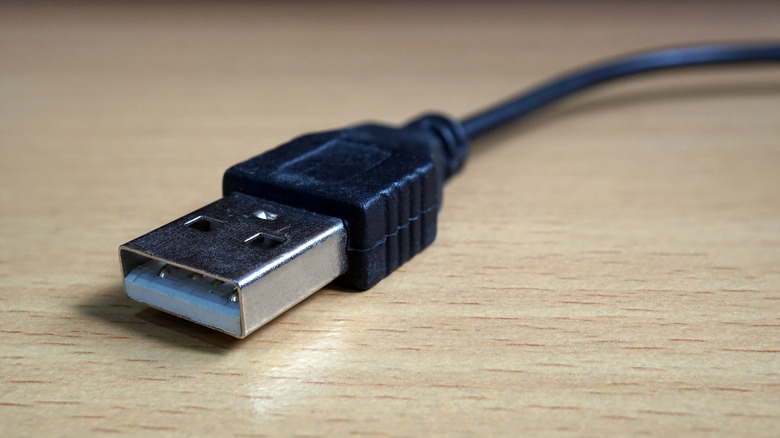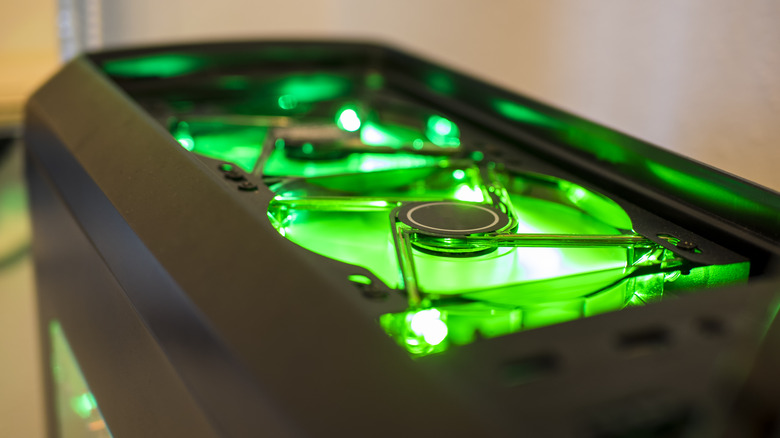Mistakes Everyone Makes When Buying A Gaming PC
Whether you're coming from console gaming or you're a brand-new gamer, there's nothing quite like playing on PC. The sky is the limit when it comes to how your games look. You have a wide variety of peripherals to choose from. Games often cost less on PC than they do on console. And you can usually escape having to pay for online multiplayer, which is something you can't do on an Xbox One, PlayStation 4, or Nintendo Switch.
But buying a gaming PC? It's not as easy at it seems.
Some companies sell outdated systems and make them sound much better than they are. Some sell stripped-down PCs in order to offer a lower price. And some simply offer hardware options that might not fit your needs. Doing your due diligence is important, because making a mistake won't just cause you to waste your money — it'll unnecessarily stress you out, too.
Here are the mistakes most people make when buying a gaming PC.
Picking something with an underpowered CPU
Those shopping for a gaming PC don't exactly have it easy. With a dedicated game console, you know what you're getting. Whether its an Xbox One, PlayStation 4, or Nintendo Switch, you can count on the hardware being consistent. Games developed for those platforms are targeted for the hardware those consoles use. And you can be reasonably sure that each console's CPU is capable of powering those games.
That's not always the case with gaming PCs.
In an effort to get the price down, some gaming PCs intentionally obfuscate how powerful its included processor actually is. Sure, the system might pack an Intel or AMD processor. And there might be a powerful-looking number next to the "GHz" on the spec sheet. But other factors are far more important. What generation chip is being used? Is the processor elite or bargain basement? And how many CPU cores are there?
If you buy a gaming PC that has a low-tier, single-core chip, you're gonna have a bad time. Even the friendliest games will tax that processor and push it to its limits. So make sure the system you're buying as a processor that can handle the complex computations most AAA titles demand.
Not factoring in the amount of RAM you'll need
RAM, which stands for random access memory, is more important in PC gaming today than ever before. You can think of RAM as a backpack, of sorts. PC games store the files and information they need to quickly access in RAM, much like you would store the books you need in a backpack. The larger the backpack, the more books you can carry. And the more RAM your gaming PC has, the quicker it can load things like textures in a game.
If you don't have enough RAM for a game that needs it, it can absolutely cripple that game's performance.
Here's why. When a game doesn't have the optimal amount of RAM available, it uses what's called a "paging file" on your computer's hard drive. Hard drives are almost always slower than RAM, so when a game has to pull assets from the hard drive, it takes longer. On low RAM machines, games can have issues loading textures or areas of the game world in time, and from there, all sorts of issues follow.
Make sure you're buying a system with enough RAM. These days, 8 GB of RAM should be the absolute bare minimum. And even that amount is quickly becoming insufficient. So if you can, go for 16 GB of RAM or higher.
Not looking at the graphics hardware included
Much as they do with CPUs, some gaming PC manufacturers like to play games with the included graphics hardware. They'll include a lower-end Nvidia GeForce or AMD Radeon card and bank on those names making the card sound more powerful than it actually is. Or they'll use on-board graphics — the kind built right into the motherboard — and try to make you think you're getting a workhorse when you're really getting a donkey that can barely stand up straight.
If you're going to jump into the world of PC gaming, it's crucial that you familiarize yourself with graphics cards.
Nvidia and AMD are the two big names in the market. But you're getting taken for a ride if you're led to believe that those names are enough. Both manufacturers build cards that cover the entire spectrum when it comes to power, so it's good to know where the entry point is for a solid PC gaming experience. You should look at systems that include an Nvidia GeForce 1060 or an AMD RX 580, at least. And the higher you can go from there, the better.
Buying without a regard for future expandability
One of the big downsides to buying a video game console is how closed off they are. Sure, you can count on it working out of the box. And the standard hardware makes it easier for developers to squeeze every last bit of power from them. But they're essentially frozen in time. If you want a more powerful PlayStation, you can't just tear it open and update the graphics card. You have to wait for Sony to make one, and then you have to buy it.
But you're buying a gaming PC. Why get locked into the console way of thinking?
You shouldn't. Which is why you should avoid gaming PCs that try to ape the look of game consoles, or PCs that come in small cases. The glory of owning a PC comes in the way you can expand it all by yourself. If you buy something that doesn't leave a whole lot of room for said expansion, you're leaving yourself with fewer options.
Graphics cards are only getting bigger. The top-tier cards sometimes these days can take up two slots, and come fitted with their own cooling systems. They're massive. If you buy a tiny gaming PC, the odds of getting one to fit when the time comes to upgrade is next to none. So in this instance, equate size to power and buy yourself a system with an enormous case. You'll be glad you did.
Not making sure the operating system is included
A lot of people who buy gaming PCs do almost everything right. They make sure the processor is up to snuff. They ensure that the graphics card is capable of running the newest and best games. And they take future expandability into account. And yet they marvel at the price of the system they're looking at, because it seems to be a hundred bucks less than other comparable machines.
So they order it. When it arrives, they excitedly unbox it and get it set up. And then they press the power button and come to a startling realization.
There's no operating system.
Yes, this is a real thing that happens. Some gaming PC companies will look to get an edge on price by completely omitting the operating system from the package. For some gamers, this is okay, as they might have a copy of Windows lying around that they can use. But if you're purchasing a system for the very first time and you don't have a spare Windows license, you're looking at paying even more after the fact. A copy of Windows 10 Home currently costs $139. Are you saving that much by getting a system without it?
Save yourself the trouble. Make sure Windows comes included and installed on your gaming PC before you buy it.
Not looking for physical media support
We live in an increasingly digital world — one where online game marketplaces like Steam and Origin allow you to download games without ever having to leave home. They offer a look at the inevitable future. Someday, disc-based media simply won't be a thing anymore. We'll download everything. We'll stream everything. And our internet connections are going to get slammed as a result.
Still, some gamers enjoy buying games on DVD or Blu-Ray. And they're often shocked to find that, upon buying a gaming PC, they have no place to put those discs.
If you're one of those gamers who likes those boxed retail copies, or if you simply want to watch a Blu-Ray movie every once in a while or rip a music CD, take extra care to make sure that the system you're buying has a disc drive. A lot of gaming PC manufacturers are leaving them out these days as a way to trim back a bit on costs, and if you don't pay close enough attention to the spec sheet for the PC you're purchasing, you could find yourself having to install one on your own.
And that's just an unnecessary headache.
Not checking for connectivity options
There are a number of advantages to running your gaming PC on a wired ethernet connection. For starters, you're not at the mercy of a WiFi radio signal, which can suffer from outside interference and connection drop-offs. And you're almost guaranteed to get faster speeds on a wired connection, which can mean all the difference when you're downloading games or playing online multiplayer.
But not every gamer has the luxury of running a wired connection. Their home may not be wired for ethernet, or they might not be close enough to their router to have ethernet available as an option.
But you'll have a hard time telling that to companies that sell gaming PCs.
A stunning amount of pre-built gaming PCs don't come with integrated WiFi — which means you'll have to buy your own adapter or WiFi card. And you'll likely run into the same issue if you utilize Bluetooth peripherals like headsets or gamepads, because many gaming PCs don't offer Bluetooth out of the box, either.
Pay attention to the connectivity options offered by a system when you're looking to buy. If things like WiFi and Bluetooth aren't built in, you'll incur some extra costs adding those features yourself. And you'll miss out on some sweet gaming time in the process.
Not ensuring support for the latest standards
You may have noticed a trend when it comes to some of the above items and how they relate to gaming PC manufacturers. The line that you can draw through them all? Cost savings. Companies that sell gaming PCs often look for ways to cut costs and sell at the lowest possible price, and they wind up cutting out very important features to hit a certain price point.
Another way these companies cut costs? By using older parts. And if they use an older motherboard, for example, you might find yourself feeling disappointed rather quickly.
Older motherboards might not support some of the newest hardware standards, such as USB 3.1. That means your peripherals will transfer data at a much slower rate, and if you're someone who routinely uses external hard drives or backs up your smartphone on your PC, those slower transfers can become mighty frustrating.
Make sure you're getting relatively recent tech in any system you buy. Your PC will become outdated a lot more quickly if you don't.
Buying because the case looks cool
You know the old saying that you can't judge a book by its cover? It's one you'll want to keep in mind when buying a gaming PC. Because, hey, it's totally understandable that you'd want an attention-grabbing system. You're well within your rights to want a futuristic-looking case with all sorts of neon lighting and special effects. It's one of the perks of gaming on PC — you can get a PC that looks any way you want.
But an attractive case does not mean the PC itself is great.
One of the biggest mistakes you can make when buying a gaming PC is doing so based on looks alone. You could choose something that looks like a true powerhouse, but in reality, can barely run decade-old games. Gaming PC manufacturers love to stuff old, outdated hardware into brand new cases in an effort to fool you. Only when you power it on and try to load the year's hottest release will you discover how weak your system actually is.
And you won't be very happy about it.
Not reading reviews about a company's customer support
We sincerely hope that you never run into issues with the gaming PC you buy. With all luck, you'll pick a system, get it delivered to your front door, set it up, and enjoy years of happy gaming afterward.
But you won't always be so lucky. Issues creep up from time to time, and in those circumstances, you might have to contact your PC's manufacturer for support. Which is why you should place a huge premium on good customer support.
Before you buy, read the reviews left by other customers — especially those who've had to interact with a company's support department. Did they have a good experience and have their problem resolved swiftly? Or did the PC manufacturer leave them hanging out to dry, sticking them with a broken PC and a whole lot of remorse about their purchase?
When you find a company you feel offers good customer service, purchase from them. Hopefully you'll never need to contact that company for support. But knowing you can if you have an issue, and knowing they'll hook you up — that offers the kind of peace-of-mind that money can't buy.

